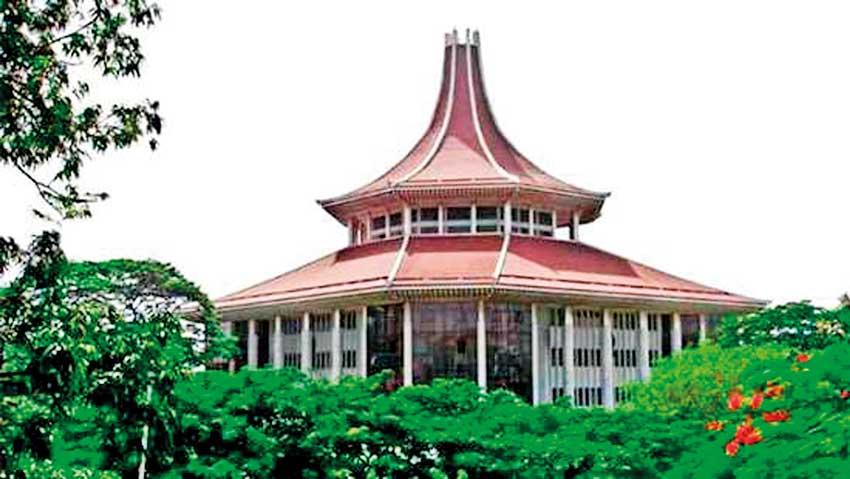11 Feb 2023 - {{hitsCtrl.values.hits}}

It is regrettable that having been a former Judicial officer, the writer seems to turn a blind eye to the fact that these prosecutions are not within the purview of the AG’s Department
 It is with great concern that the legal profession has noted the unfounded allegations made against the Hon. Attorney General and the Attorney General’s Department by Justice Chandradasa Nanayakkara in his recent article carried in the Daily Mirror of 03 February, 2023 titled “Attorney General and His Prosecutorial Staff”.
It is with great concern that the legal profession has noted the unfounded allegations made against the Hon. Attorney General and the Attorney General’s Department by Justice Chandradasa Nanayakkara in his recent article carried in the Daily Mirror of 03 February, 2023 titled “Attorney General and His Prosecutorial Staff”.
It seems that the article comes in the wake of media shows and tamashas that had been the practice of the previous holders of office, resulting in a needless and a frivolous outcome that had created a false sense of expectations in the eye of the public. This had been further reinforced by the role played by certain lawyers in strengthening the hand of the politically motivated stakeholders.
A former Justice of the Court of Appeal himself, it would appear that Justice Nanayakkara would possess a better understanding of the workings of the AG’s Department as the premier legal institution representing the State.
Unlike a layman, he should be aware of the powers vested with the Institution and the Bribery Commission in terms of the law to present indictment for bribery and corruption are distinct powers conferred by law. It also must be noted that these Institutions are vested with power to withdraw such indictment as relevant to their scope of work. It is regrettable that having been a former Judicial officer, the writer seems to turn a blind eye to the fact that these prosecutions are not within the purview of the AG’s Department. Having served as a sitting Judge, the author himself is aware of the fact that any such withdrawals as stated by him are not pursued by the Department.
With regard to the serious allegations the author makes against the AG’s Department concerning the withdrawals of many high profile bribery cases involving politicians and other influential people, it seems he is forgetting the most basic protocol which is that the AG does not possess the power to withdraw bribery or corruption charges.
It must be further noted that the only application concerning a powerful politically exposed person was undertaken on the basis of the first indictment under which he was acquitted by the High Court of Colombo, after trial. Based on the same facts, officers of the AG’s Department brought it to the notice of the Court and with the permission of the Court, the indictment was withdrawn. It is apposite to quote Sansoni J in AG Vs. Sivapragasam et al 60 NLR 468 at P 470, wherein, it is stated “The only object of leading evidence for the prosecution is to establish the ingredients of the charge, and is counsel is not satisfied in his own mind that the totality of the evidence will achieve that result, he will be failing in his duty to the Court and to the accused if he were to insist on a fruitless recording evidence and a senseless waste of time. It is quite wrong to suppose that a Prosecuting Counsel’s duty is a mere mechanical leading of evidence regardless of the object for which evidence is led. If he is satisfied that the evidence is insufficient to prove the charge and insists on leading evidence, how can be in conscience ask the Court to convict the accused?”
Therefore, the expectations of an officer of the AG’s Department have been met in the only case so withdrawn. He is perhaps not aware of this instance at time of writing the article.
It must be acknowledged we live in an era where seamless communication can highlight many aspects of legal opinions. However, it must be noted such undertaking must be done with utmost caution and respect for the rule of law.
The author’s sentiments may have created false perceptions in the mind of the public concerning the role of the AG and his Department. However, it is pertinent to note that under the adversarial system practiced in Sri Lanka, the AG’s Department does not spearhead investigations as is the norm for countries such as the USA.
Accordingly, as the author himself states, the role of the AG is limited to filing action in a Court of law, subject to the investigations conducted and concluded by the law enforcement authorities.
However, in the event of an acquittal, the outcome of the case does not convey any lack or contribution of the AG’s Department. Neither can such accusations be made against the esteemed members of the judiciary.
It seems that the writer may have strived to undermine the role of the AG within the entire legal system thereby create a false narrative that will result in undervaluing of the AG’s Department in the eyes of the general public who is unaware of the ethics and the code of conduct that governs the AG and his Department.
It must be stated that at all times, the AG and his officers have ensured the undertaking of legal provisions entrusted to him under the law with transparency and accountability.
25 Nov 2024 10 minute ago
25 Nov 2024 11 minute ago
25 Nov 2024 19 minute ago
25 Nov 2024 19 minute ago
25 Nov 2024 47 minute ago